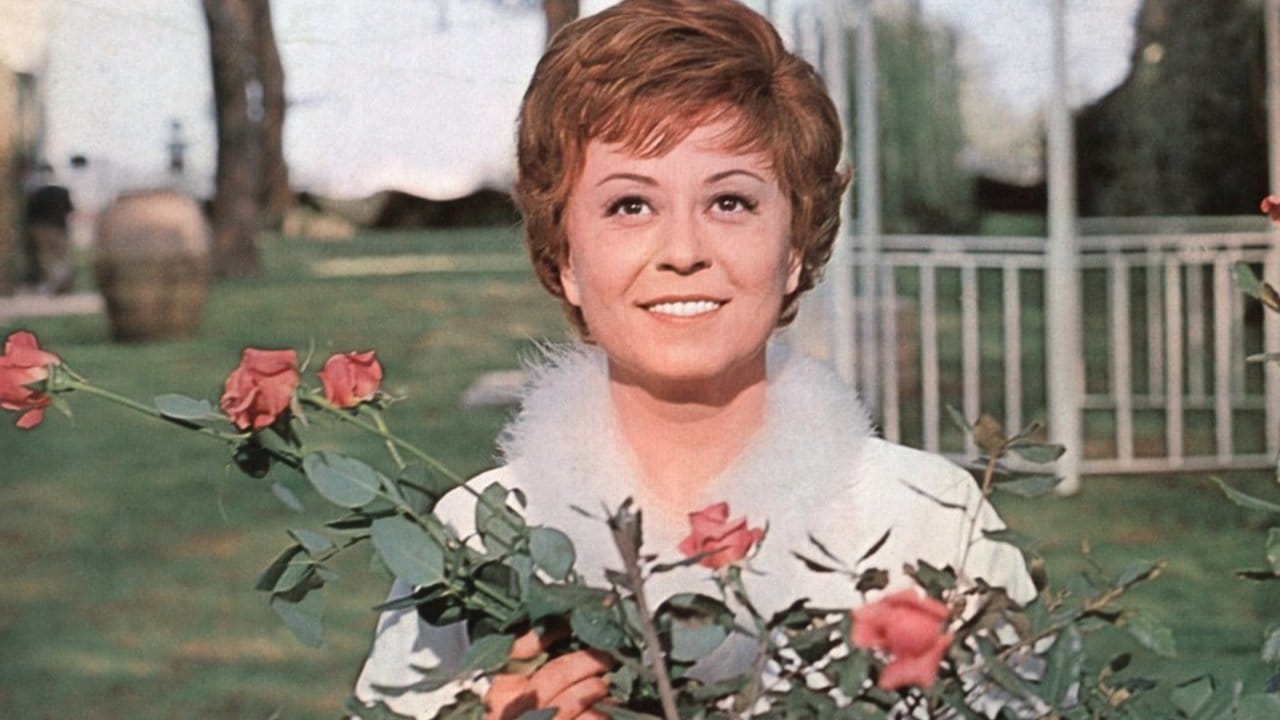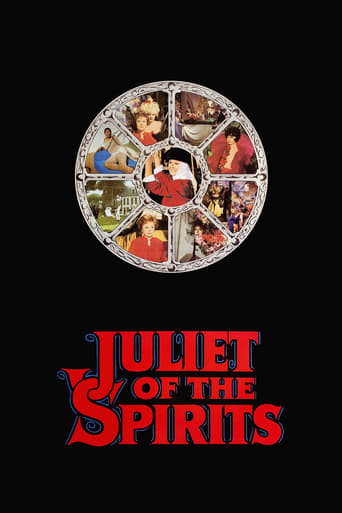

hyped garbage
... View MoreExcellent, smart action film.
... View MoreIt's not great by any means, but it's a pretty good movie that didn't leave me filled with regret for investing time in it.
... View MoreThere are moments in this movie where the great movie it could've been peek out... They're fleeting, here, but they're worth savoring, and they happen often enough to make it worth your while.
... View MoreJuliet of the Spirits (Italian: Giulietta degli spiriti) (1965) Art film tackles Freud. Disturbing and indulgent, Surreal dreams, strange scenes, A female 8½, Technicolor Fellini! Tanka, literally "short poem", is a form of poetry consisting of five lines, unrhymed, with the 5-7-5-7-7 syllable format. #Tanka #PoemReview
... View MoreVisions, memories, and mysticism all help a forty-something woman (Giulietta Masina) to find the strength to leave her cheating husband (Mario Pisu).This was Fellini's first feature-length color film, and he used that color as best he could. Stephen Holden wrote, "Fellini went deliriously and brilliantly bananas with the color to create a rollicking through-the-looking-glass series of tableaux evoking a woman's troubled psyche." Roger Ebert wrote, "The movie is generally considered to mark the beginning of Fellini's decline... I think it's Fellini's best movie." Now, I would not necessarily say this is his best movie, but I also would not say it was not. Indeed, it has so much going on that it is hard to ignore. Not just the color, but the fantasy. As Ebert points out, this was supposed to be Fellini's film for his wife, but is obviously still told from his perspective...
... View MoreThe 60's were a pivotal period for Fellini where he gained on international stature and self-confidence regarding his artistic talent, but while he managed to create situations I could respond to in his earlier works, the whole time I felt sorry for Guiletta Masina in "Juliet of the Spirits" and I don't mean Juliet, but Guiletta. Guiletta is not Gelsomina or Cabiria, the inspirational misfit who carries a whole film, embodying its emotional core. Guiletta is unusually passive, like carried away by the decadence of the high-class society she lives in, and much more, being probably the least desirable female character from the casting: two realities she can't do nothing about them. I understand the point was to make her look like an outcast, but even within the whole story, something was odd in her character. She was like prisoner in a dream that is not even her own, the dream of her husband, another Fellini's fantasy, using his wife as a ... sorry, for the term, as an excuse. I respect and admire Fellini, but I'm only speaking out of my love for Guiletta Masina, who looks particularly unhappy all through the picture. She creates a disturbing contrast between the dazzling colors that Fellini obviously experiments with a certain delight (it was his first feature film in color) and the dark torments filling her heart with an angry frustration, even more frustrating because she's resigned to keep her grieves silent. But her sad eyes convey this feeling of abandon, of being reduced to a negligible entity by her philandering husband Giorgio. Of course, this is not to say that Masina wasn't "good", her performance fitted the film's subtext, but something was cruelly lacking in her character, it's just as if her soul had no passion whatsoever. She was passive, had her share of disturbing visions, lyrical envies and mystical temptations but I'm sorry, I'm a guy, I'm 30 and I'm sure a woman like Juliet wouldn't have these sort of visions, but Master Fellini would. Damn, I can't believe there would be another film making me talk like a feminist, the first one was "MASH", but this one is much worse because it was presented as a sort of feminine version of "8½", where we'd discover the subconscious of a woman, and that her name is Guiletta leaves up no doubt that she's meant to be the alter-ego of Masina. But what's the deal with a woman capable to talk to some spirits, hiding her most repressed secrets, and being pushed to fulfill her own dreams when she only dreams of peace and stability? The movie could almost pass itself for an introspective journey into the inner torments of middle-aged bourgeois housewife, but this is too cerebral for a Fellini film. And I'm only saying this because if there is one thing I learned from Fellini, it is that he's an artist, a man of images. And looking at the images, I have no doubt this is Fellini's own fantasy speaking, and it's so upsetting that I tend to see Fellini as the alter-ego of the unfaithful Giorgio, Mario Pisu even looks like a clone of Guido, Marcello Mastroianni in "8½" who was supposed to be an alter- ego of Federico Fellini. Indeed, "Juliet of the Spirits" strikes by a dazzling and beautiful cinematography in color, but that's no surprise since the images speak more in Fellini's film than any intelligent or constructive idea. And in "Juliet of the Spirits", Fellini's fans would not be disappointed, they have their share of Fellinian imagery: the circus parades, people dancing in unison, women with voluptuous bodies, curvy forms and sensual lips awakening our most vicious appetites. At first, it pleased my eyes, then it puzzled my mind, then I finally got it and could watch the film, quite relieved: "Juliet of the Spirits" is a MAN's film. It says more about Fellini's personal fantasies than anything about both Juliet and Guiletta combined. Not that it bothered me or prevented me from appreciating it, but then the figure of Masina with her sad look, and resigned face killed some of the enjoyment. I even pitied her more than Juliet, because at least Juliet was still a character. Fellini is not just an artist, he's a complete Mediterranean hedonist, a man of flesh, body, sweat and music, sensations, fruits and wine, the sangria is made of both and tastes like the incarnation of Fellini's sensuality. In contrast, Juliet is a woman who drinks water, she likes transparency, serenity ... but water is also synonym of platitude, which in the context of the film, is synonym of dullness. The word 'Spirits' implies the greater contrast with her husband who's not turned on by things from the other side, but a woman like Juliet, who looks almost asexual with her elf-like looks can be associated to this world. I'm not diminishing Juliet at all, after all, she's classy and elegant and the only character with redeemable qualities, but it's pretty clear Fellini made her look diminutive compared to the other women, hell, she's towered by every one in the film, including her mother and sister. I'm not discussing the artistic value of the film, arty at its best, and if only for being the first Fellini in color and the last to give a prominent role to Guiletta Masina, it deserves one, two, as many viewings as it'd take. But this is not "La Strada" or "Nights of Cabiria", it's more of a colored "8½" using a woman as an excuse. As Fellini's film, it's a great one, but just because it was supposed to be a gift to Masina, to be a film about her, I can't regard it with the same passion. Well, I guess the appreciation of "Juliet of the Spirits" can be translated into one dilemma, to which sensitivity do you most relate to: Fellini's or Guiletta's?
... View MoreI have a lot of admiration for Federico Fellini and his films. His style is not for everybody, people will find it fascinating complete with beautiful visuals, a personal and nostalgic sense of storytelling and characters that are not what they seem on first glance, but others may find him/them self-indulgent or dull. While I can understand the latter viewpoint, I belong in the those who find him/them fascinating camp.Juliet of the Spirits is not my favourite Fellini film. My pick for best is between La Dolce Vita and 8 1/2, though I also give Nights of Cabiria a big shout out for being the film that resonated with me the most emotionally. Amarcord and La Strada are also splendid. In fact of the nine films seen so far(including this, Casanova, Roma and Satyricon) even my least favourite so far, Satyricon which I found his weirdest film and a little disjointed, have many points of merit.A perfect film? Not quite for me. I did feel that a few scenes did feel less focused than others in terms of tone and that a couple dragged. Then again, like with all Fellinis, I think a couple of re-watches might do the trick.But Juliet of the Spirits has many things to admire about it. While not all the scenes worked entirely for me, I found the mix of dreams, Jungian psychology, spiritualism and astrology very interesting, if perhaps not as spellbinding to watch as 8 1/2, and much more even and less jumpy in structure than Satyricon. The characters I was at least engaged with, I didn't quite identify the whole step of the way with the titular character completely like with Nights of Cabiria and La Strada, but again unlike Casanova I didn't find her a detached character either.Visually, Juliet of the Spirits is stunning. The use of vibrant colours, beautiful settings and colourful costumes are as ever a feast for the eyes. Fellini's direction is overall superb, the films I cited as my favourites in the first paragraph, as well as Roma, had more of a personal and nostalgic value, but the sense of craftsmanship and care that goes in every film of his I've seen really shines through here. Nino Rota's score is bright, characterful and not too obtrusive.Giulietta Masina is a big part of why Juliet of the Spirits works very well on the whole. Her ever expressive face makes for a both spirited and moving performance. The supporting cast support her well. All in all, an interesting and very good film if falling short just of greatness. 8/10 Bethany Cox
... View More